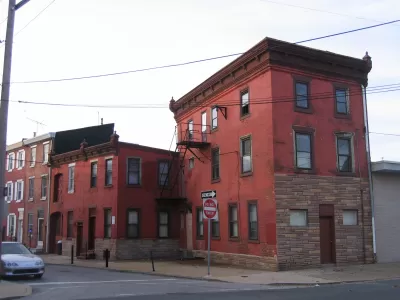Blessed with an innate resilience, Philadelphia's brick rowhouses risk disrepair and redevelopment. Local nonprofits are looking for ways to keep this resource equitable.

Last year, Philadelphia's city council "approved the strategic plan of a new land bank to target the redevelopment of thousands of vacant buildings, lots and other tax-delinquent properties."
But the appearance of dilapidation can be deceptive: the city's rowhouses have good bones. "'Our brick rowhomes are those houses that the wolf couldn't blow down in the three little pigs story,' says Karen Black, a former civil rights lawyer and current CEO of May 8 Consulting."
The Healthy Rowhouse Project challenges oncoming gentrification, arguing that existing stock will always be more affordable than new units, "'because it costs more than $300,000 to build a single unit of affordable housing,' says Black. 'At the same time, we can repair an existing home that people are already living in for $10,000 or less.'"
Meanwhile, others want to make it harder for speculators to displace longtime residents. The Philadelphia Coalition for Affordable Communities (PCAC) has proposed a so-called "flip tax" that "would tack on a 1.5 percent fee to the city's 4 percent realty transfer tax for properties that sell more than once in 24 months."
FULL STORY: How Philly Could Fight Gentrification With Rowhouse Fix-Ups

Alabama: Trump Terminates Settlements for Black Communities Harmed By Raw Sewage
Trump deemed the landmark civil rights agreement “illegal DEI and environmental justice policy.”

Study: Maui’s Plan to Convert Vacation Rentals to Long-Term Housing Could Cause Nearly $1 Billion Economic Loss
The plan would reduce visitor accommodation by 25% resulting in 1,900 jobs lost.

Planetizen Federal Action Tracker
A weekly monitor of how Trump’s orders and actions are impacting planners and planning in America.

Wind Energy on the Rise Despite Federal Policy Reversal
The Trump administration is revoking federal support for renewable energy, but demand for new projects continues unabated.

Passengers Flock to Caltrain After Electrification
The new electric trains are running faster and more reliably, leading to strong ridership growth on the Bay Area rail system.

Texas Churches Rally Behind ‘Yes in God’s Back Yard’ Legislation
Religious leaders want the state to reduce zoning regulations to streamline leasing church-owned land to housing developers.
Urban Design for Planners 1: Software Tools
This six-course series explores essential urban design concepts using open source software and equips planners with the tools they need to participate fully in the urban design process.
Planning for Universal Design
Learn the tools for implementing Universal Design in planning regulations.
Caltrans
Smith Gee Studio
Institute for Housing and Urban Development Studies (IHS)
City of Grandview
Harvard GSD Executive Education
Toledo-Lucas County Plan Commissions
Salt Lake City
NYU Wagner Graduate School of Public Service





























